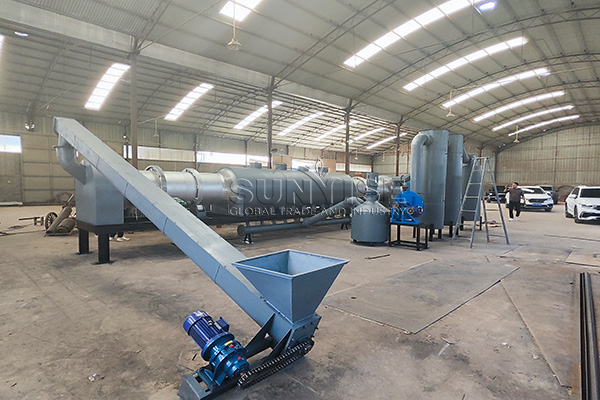Charcoal production has been an essential industry for centuries, providing fuel, reducing agents, and even filtration materials. Traditional methods of charcoal production can be labor-intensive and environmentally harmful, often resulting in inconsistent product quality. However, continuous carbonization equipment offers a modern solution, transforming the production process into one that is efficient, environmentally friendly, and capable of producing high-quality charcoal consistently.

The Need for Modern Charcoal Production
In today’s world, the demand for efficient and sustainable production methods is more critical than ever. Traditional charcoal kilns, often used in rural settings, produce significant amounts of smoke and greenhouse gases. They also typically have low conversion rates, meaning that a large amount of raw material is required to produce a relatively small amount of charcoal. This inefficiency not only contributes to deforestation but also exacerbates environmental degradation. As a result, there is a pressing need for more modern, efficient, and sustainable charcoal production methods.
Advantages of Continuous Carbonization Equipment
Continuous carbonization equipment represents a significant advancement in charcoal production technology. This equipment is designed to streamline the carbonization process, offering numerous advantages over traditional methods.
Increased Efficiency
One of the most significant benefits of continuous carbonization equipment is its efficiency. These systems operate continuously, unlike traditional batch processes, allowing for the constant processing of raw materials. This continuous operation minimizes downtime, maximizes throughput, and significantly increases overall production efficiency. The equipment also maintains optimal temperatures and conditions, ensuring complete carbonization and a higher yield of charcoal.
Consistent Quality
With traditional methods, controlling the quality of the charcoal can be challenging due to fluctuations in temperature and inconsistent carbonization conditions. Continuous carbonization equipment, however, provides precise control over the carbonization process. This results in charcoal with consistent quality and characteristics, such as fixed carbon content, ash content, and energy value, making it more suitable for various industrial applications.
Environmental Benefits
Continuous carbonization equipment is designed with environmental sustainability in mind. These systems typically incorporate advanced emission control technologies that reduce the release of harmful gases and particulates into the atmosphere. Additionally, they can utilize waste heat recovery systems, further improving energy efficiency and reducing the carbon footprint of the production process. This environmental stewardship is increasingly important as industries strive to meet stricter environmental regulations and sustainability goals.
Versatility and Adaptability
Another advantage of continuous carbonization equipment is its versatility. These systems can process a wide variety of biomass materials, including wood chips, coconut shells, and agricultural waste. This adaptability allows producers to utilize locally available raw materials, reducing transportation costs and supporting local economies.
Conclusion
Choosing continuous carbonization equipment for charcoal production offers numerous benefits, including increased efficiency, consistent quality, environmental sustainability, and versatility. As global demand for sustainable and high-quality charcoal grows, this technology provides a pathway for producers to meet these demands while minimizing environmental impact. By investing in continuous carbonization equipment, producers can enhance their operations, reduce costs, and contribute to a more sustainable future. As industries continue to evolve, embracing such innovative technologies will be crucial in meeting the challenges of tomorrow. Visiting: https://www.char-molder.com/product/continuous-carbonization-furnace/
Leave a Reply